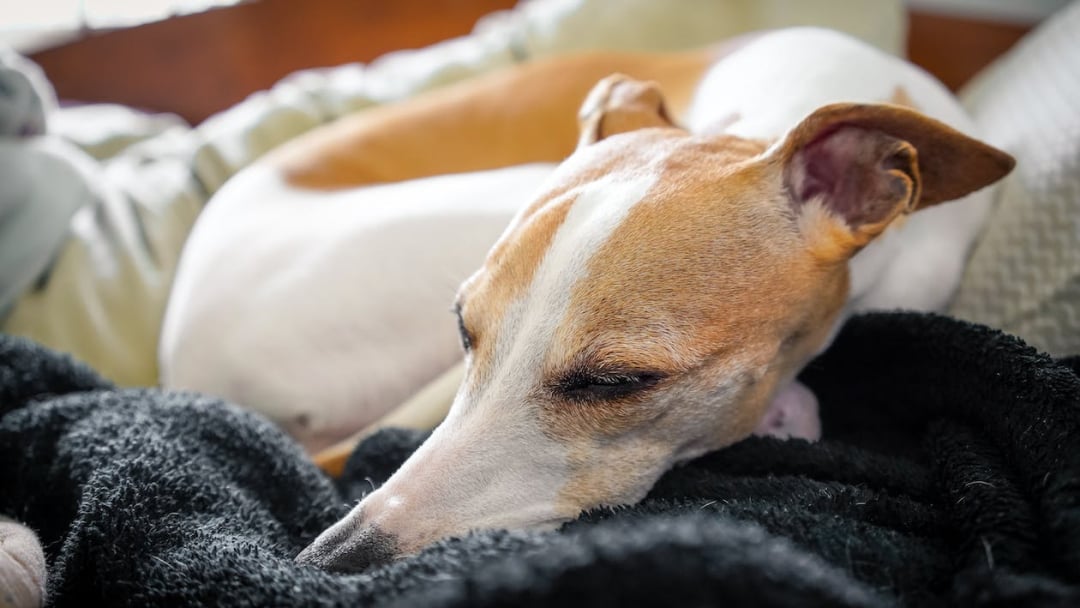
Have you noticed your dog twitching while sleeping? This could just mean that they’re having a vivid dream. Your dog may even bark or their paws may quiver. Most of the time twitching in sleep is normal dog behavior. But it can occasionally mean something else is going on. Keep reading to find out some of the reasons why a dog twitches in their sleep.
Your dog jerks and twitches while sleeping due to involuntary muscle spasms called myoclonus. These occur in both humans and dogs. They cause your pooch to have a sudden and rapid movement that can occur in one part of the body or the whole body. Dogs most commonly twitch the back legs or tail while sleeping.
Other possible reasons for your dog twitching in their sleep include anxiety, bad dreams, normal growth and development, overstimulation, fear from thunderstorms or firecrackers, night terrors, and advanced age. Exposure to certain toxins that can cause seizures in dogs may result in twitching while sleeping. The twitching could also be from an underlying health condition such as arthritis, muscle stiffness, epilepsy, kidney disease, liver disease, or diabetes.
If you feel the twitching is excessive, take your dog to the vet for an evaluation.
It’s common for a dog to twitch the tail, back legs, or other parts of the body during the REM stage.
Dogs sleep for an average of 12-14 hours a day. Like humans, dogs also cycle through REM and non-REM sleep cycles. The REM or rapid eye movement stage is also called the dream stage.
There can be other movements and vocalizations during REM sleep such as flickering of the eyes under the lids, whimpering, barking, or kicking the paws in the air. This just means your dog is having interesting dreams and responding to them with physical signs like muscle twitches.
Yes, you should let your dog twitch in her sleep. A dog twitching in her sleep means she is in deep, restful sleep.
Most dogs will twitch or paddle their legs in the air for less than 30 seconds while they’re dreaming. This can occur repeatedly throughout the night. If you notice more sustained or more severe twitching while your dog is sleeping, something else may be going on. Consider making a video and showing it to the vet if you’re worried.
Vets do not advise awakening a dog that is twitching in their sleep. Unless your dog clearly appears to be in distress, these involuntary movements are normal and should not be interrupted. Even if you think your dog is having a night terror or nightmare, do not wake him up. However, if you think your dog is in distress, gently call his name to try and wake him up. Do not touch a dog that is twitching or having a night terror as this can frighten them even more and result in the dog biting you.
Dogs dream about whatever happens during the day. When your dog is twitching during sleep, he or she is processing and understanding daytime experiences during dreamtime. In addition to muscle twitches, doggy dreams can result in snoring, eye fluttering, whisker twitching, whimpering, and running paws.
If your dog has short muscle twitches, paddles her legs in the air, or makes excited noises, she is likely having a good dream. On the other hand, if your dog whines, whimpers, or growls while sleeping, it’s possible she’s having a bad dream that is making her feel anxious or threatened.
Many people worry that a dog twitching in their sleep could be seizures (convulsions). Clues that the twitches are from seizures include stiff limbs, more aggressive movements, and twitches lasting more than a few seconds. Also, dogs tend to be confused and dazed after a seizure. If you are worried that your dog twitching during sleep might be seizures, make a video and show it to your vet.
You should take your dog to the vet without delay if you notice other symptoms such as foaming at the mouth, vomiting, or having an accident (urinating or defecating) during sleep along with twitching while sleeping.
17 December, 2022